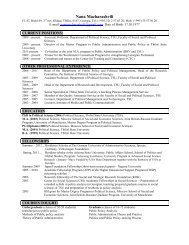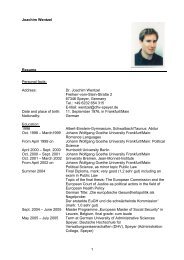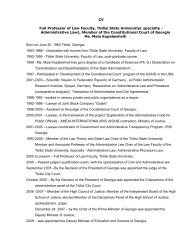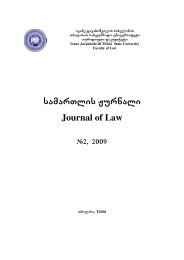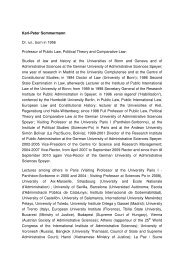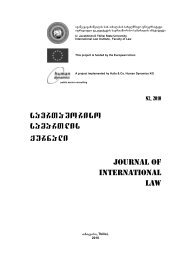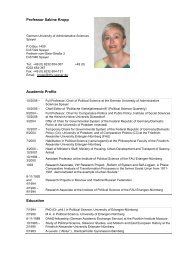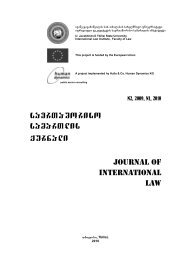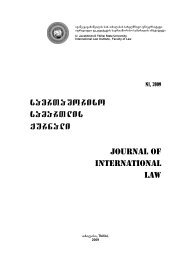Untitled
Untitled
Untitled
You also want an ePaper? Increase the reach of your titles
YUMPU automatically turns print PDFs into web optimized ePapers that Google loves.
saerTaSoriso samarTlis Jurnali, #1, 2008 JOURNAL OF INTERNATIONAL LAW, N1, 2008<br />
ditions, which extremely decreases the number<br />
of such cases, when the citizen has a real<br />
opportunity to exercise diplomatic protection<br />
through his/her State.<br />
First most important requirement, related<br />
to the national bond between a State and victim,<br />
is not limited only to determine such bond.<br />
Moreover, shall be defined weather the form<br />
of obtaining nationality complies with the requirements<br />
of international law. Determination<br />
of the issue of nationality to be completely<br />
under the jurisdiction of a State is the most<br />
reasonable and logical. In this case, such incidents<br />
may be avoided when the citizen having<br />
tight national bond with the State throughout<br />
the years remains without protection only<br />
due to the fact that the form of obtaining citizenship<br />
contradicts to the requirements of international<br />
law.<br />
The issue of citizenship does not end with<br />
this. "The principle of continuous nationality"<br />
following to its vague content may create artificial<br />
problems for exercising diplomatic protection.<br />
Although, the existence of continuous<br />
nationality is certainly an essential mandatory<br />
precondition for exercising diplomatic protection,<br />
it is still unclear until which level the<br />
nationality shall be maintained. Application of<br />
such practice which requires the existence of<br />
national tie until the delivery of final judgment<br />
on the case or until its execution is extremely<br />
dangerous. In the institution of International<br />
Court, execution of justice is rather extended<br />
process. The years are required for only admissibility<br />
of some applications, not to mention<br />
the consideration of the case and delivery<br />
of final judgment, moreover the execution<br />
of this case. Throughout this entire period<br />
change of nationality by a person is not so<br />
unreal. By the strict protection of the principle<br />
of "continuous nationality" the citizen may lose<br />
the opportunity of protection in frames of international<br />
justice.<br />
Besides the abovementioned, there are<br />
numbers of other requirements and preconditions<br />
which shall be satisfied for the purposes<br />
of exercising diplomatic protection by the<br />
State, which may be, exhaustion of domestic<br />
remedies, determination of violation of international<br />
law in the action of the State, issues<br />
related to dual or multiple nationality, taking<br />
into consideration the features of exercise of<br />
diplomatic protection of natural and legal persons<br />
and their shareholders, relevant members<br />
and etc. Bearing into mind the multitude<br />
of all these conditions, and complexity in some<br />
cases, also the aims and interests of foreign<br />
policy of the State of nationality in certain<br />
cases,it is hard to discuss how real it is the<br />
expression of good will by the State on exercise<br />
of diplomatic protection.<br />
Finally, one more factor has to be taken<br />
into consideration, which has not been discussed<br />
in the main part of present paper just<br />
for the simple reason that it is related to the<br />
execution of decision of the international court<br />
and not directly connected to the legal mechanism<br />
of diplomatic protection. If the violation<br />
of international law by the State is established,<br />
this latter shall pay compensation to the injured<br />
State. Also in this case the State has discretion<br />
whether to pay the compensation received<br />
by the reparation to the violated victim<br />
or not. Commission on International Law left<br />
the issue open whether the State is obliged to<br />
pay that compensation to the injured person<br />
or no, which as form of compensation was received<br />
as a result of solving the dispute, initiated<br />
through exercising diplomatic protection,<br />
in favor of injured.<br />
Likewise all legal procedures, diplomatic<br />
protection certainly involves the satisfaction<br />
and performance of range of mandatory requirements,<br />
procedures and preconditions.<br />
Mentioned is rather logical and correct, however,<br />
diplomatic protection includes the obligation<br />
to protect numbers of minor terms, technical<br />
and formal procedures and requirements,<br />
which may raise artificial barriers for<br />
exercising this mechanism of protection. Diplomatic<br />
protection is a remedy for a State to<br />
protect its citizen against illegal action of the<br />
other country, as well as for citizens to achieve<br />
the reparation of violated law on international<br />
level. Thus, the main point while exercising<br />
diplomatic protection shall be the protection<br />
of rights and interests of the citizen and provision<br />
of proper satisfaction for the caused injuries.<br />
All formal, procedural and other kind<br />
of preconditions, which are necessary for exercising<br />
diplomatic protection, shall be exactly<br />
adjusted on this aim and idea.<br />
As we saw in the main part of the paper, in<br />
the filed of diplomatic protection positive and<br />
rather reliable trends are evident. The International<br />
Law Commission of the UN has made<br />
a great contribution in this direction and on<br />
246



